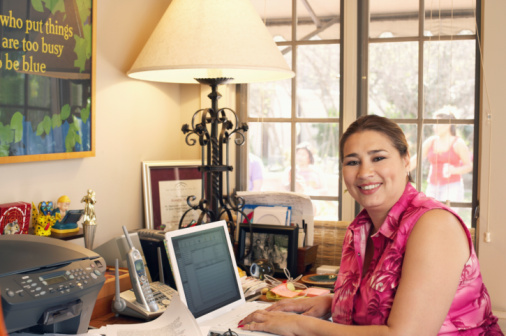 A full fifty percent of Americans work from their homes, and that number is likely to grow, given both a bad economy that forces people to think outside of the employment box, and technology that makes home-based work easier than ever. Nowadays people are doing all kinds of jobs from their homes—freelancing in various ways, eBay shops, dog walking, and party planning, to name just a few. What many people don’t know, however, is that a myriad of regulations exist that could make virtually any given home-based business an illegal endeavor. You could be running an illegal business and not even know it.
A full fifty percent of Americans work from their homes, and that number is likely to grow, given both a bad economy that forces people to think outside of the employment box, and technology that makes home-based work easier than ever. Nowadays people are doing all kinds of jobs from their homes—freelancing in various ways, eBay shops, dog walking, and party planning, to name just a few. What many people don’t know, however, is that a myriad of regulations exist that could make virtually any given home-based business an illegal endeavor. You could be running an illegal business and not even know it.
Regulations Affecting Home Based Businesses
Legality issues can come from a number of sources. For example, your apartment lease or CCRs (covenants, codes, and restrictions) may specifically prohibit use of your residence as a business. Zoning laws can also affect the legality of your home business—although they are primarily in place to prevent development that would hurt the value of the surrounding properties, they definitely can apply to a home based business, especially if it creates traffic or parking issues.
The third, and probably most common, regulation that affects home businesses is licensing requirements. A full third of workers today require licenses to practice, as opposed to just 5% in the 1950s. While licensing was put into place in most of these industries to protect consumers, many of them also thwart legitimate practitioners from making a home-based living.
How Licensing May Affect You
A New York Times piece from June tells the story of Jestina Clayton, who was raised in Sierra Leone, where traditional African hair braiding is taught to every girl. When she moved to Utah to be near her in-laws, she quickly realized that nobody in the area knew how to braid African hair, and there was a need for her skills among white adoptive parents of African-American children. Sadly, she was forced to close her business because it is illegal in Utah to do any kind of hair extensions without a cosmetology license—which takes two years and costs $16,000.
According to the piece, over 1,000 professions in the U.S. require a license to perform, and increasingly tight regulations may be preventing thousands of people from doing work they are well-qualified for.
Litigation and Change
Licensing is, in part, to protect consumers from charlatans who don’t know what they’re doing and could cause harm. Certainly we want our electricians, medical tech professionals, and opticians, for example, to meet certain educational and professional requirements before they can hang their shingle and unleash their skills on the general public. But most licensing is for the benefit of those already in the industry—to make it more difficult for new competition from up-and-comers.
Though Clayton, with the help of a state senator with adopted African-American children, attempted to get African hair braiding exempted from the Utah licensing requirements, a strong cosmetology lobby blocked all efforts. Many lawmakers see easing regulations, even those that do more harm than good, as political suicide. Occupational lobbies, who have a huge stake in keeping stricter rules in place, hold a lot of sway.
There is hope, however. In Nashville, lawmakers are looking at legislation that will ease the ban on home-based businesses that serve patrons on-site. The issue there is that Nashville is home to hundreds of private, home-based recording studios that are technically operating illegally. The new law would allow at-home music producers to have up to 10 patrons on-site per day. In California, too, laws have been loosened to allow people to sell food make in their own kitchens. Hopefully, more states will find the courage to follow suit.
What Small Business Owners Need to Know
If you have a home-based business, or are thinking of starting one, you’ll probably want to check into whether you’re doing anything illegal so you can take steps to prevent legal problems down the road. Start with your lease, rental agreement, and/or CCRs to make certain your business doesn’t conflict with any restrictions therein. Find out what the zoning regulations are for your location. Finally, make sure you aren’t performing a service that requires a license you don’t have. When your livelihood is at stake, it really is better to make changes to conform to the law rather than asking permission later, which can be a costly mistake.



